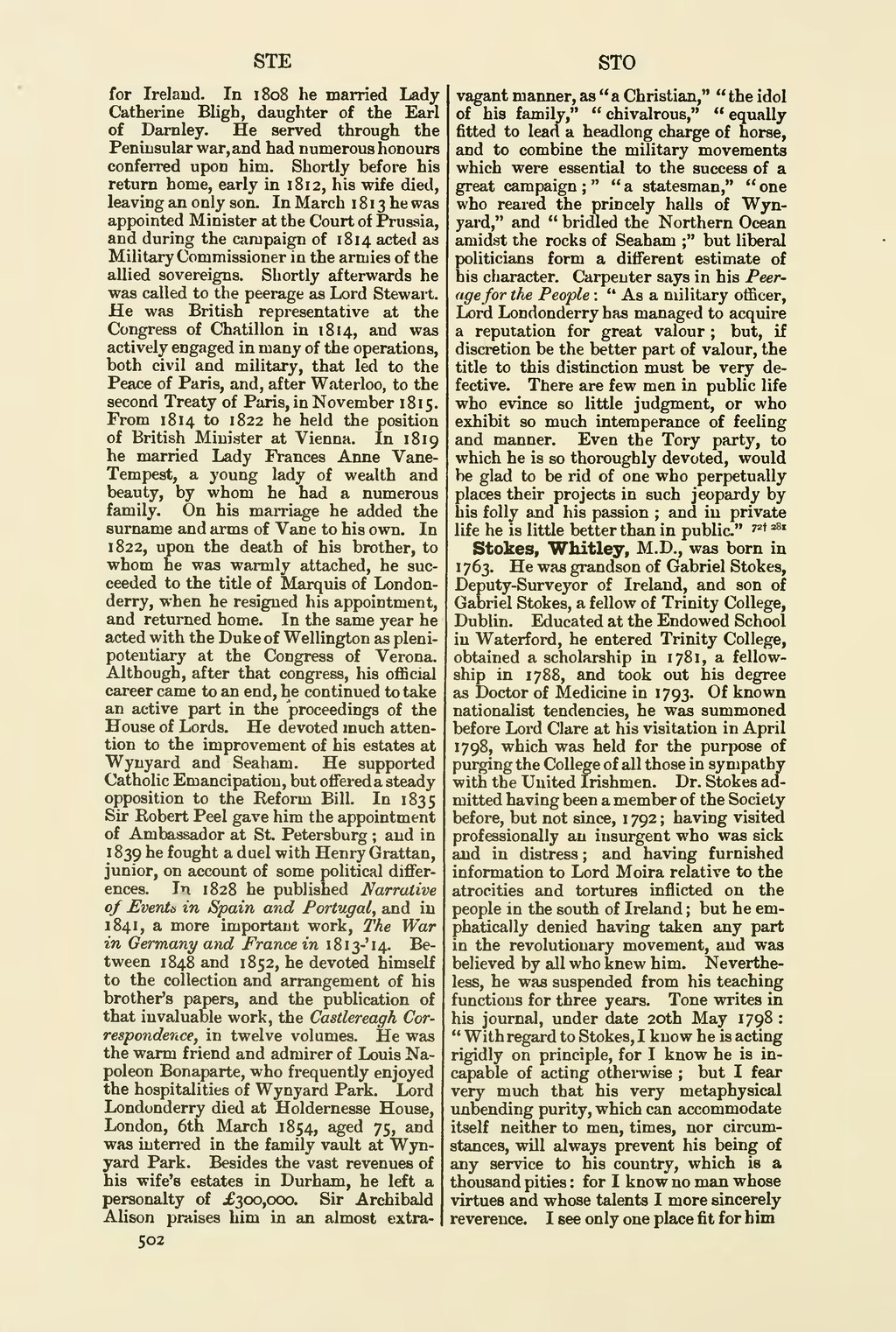STE
for Ireland. In 1808 he married Lady Catherine Bligh, daughter of the Earl of Darnley. He served through the Peninsular war, and had numerous honours conferred upon him. Shortly before his return home, early in 1812, his wife died, leaving an only son. In March 1 8 1 3 he was appointed Minister at the Court of Prussia, and during the campaign of 1814 acted as Military Commissioner in the armies of the allied sovereigns. Shortly afterwards he was called to the peerage as Lord Stewart. He was British representative at the Congress of Chatillon in 1814, and was actively engaged in many of the operations, both civil and military, that led to the Peace of Paris, and, after Waterloo, to the second Treaty of Paris, in November 1815. From 1 8 14 to 1822 he held the position of British Minister at Vienna. In 181 9 he married Lady Frances Anne Vane- Tempest, a young lady of wealth and beauty, by whom he had a numerous family. On his mai-riage he added the surname and arms of Vane to his own. In 1822, upon the death of his brother, to whom he was warmly attached, he suc- ceeded to the title of Marquis of London- derry, when he resigned his appointment, and returned home. In the same year he acted with the Duke of Wellington as pleni- potentiary at the Congress of Verona. Although, after that congress, his oflacial career came to an end, he continued to take an active part in the proceedings of the House of Lords. He devoted much atten- tion to the improvement of his estates at Wynyard and Seaham. He supported Catholic Emancipation, but offered a steady opposition to the Reform Bill. In 1835 Sir Robert Peel gave him the appointment of Ambassador at St. Petersburg ; and in 1 839 he fought a duel with Henry Grattan, junior, on account of some political differ- ences. In 1828 he published Narrative of Events in Spain and Portugal, and in 1841, a more important work, 2'he War in Germany and France in i8i3-'l4. Be- tween 1848 and 1852, he devoted himself to the collection and arrangement of his brother's papers, and the publication of that invaluable work, the Castlereagh Cor- respondence, in twelve volumes. He was the warm friend and admirer of Louis Na- poleon Bonaparte, who frequently enjoyed the hospitalities of Wynyard Park. Lord Londonderry died at Holdernesse House, London, 6th March 1854, aged 75, and was iuten-ed in the family vault at Wyn- yard Park. Besides the vast revenues of his wife's estates in Durham, he left a personalty of £300,000. Sir Archibald Alison pmises him in an almost extra- 502
STO
vagant manner, as "a Christian," "the idol of his family," " chivalrous," " equally fitted to lead a headlong charge of horse, and to combine the military movements which were essential to the success of a great campaign;" "a statesman," "one who reared the princely halls of Wyn- yard," and " bridled the Northern Ocean amidst the rocks of Seaham ;" but liberal politicians form a different estimate of bis character. Carpenter says in his Peer- age for the People : " As a military officer, Lord Londonderry has managed to acquire a reputation for great valour ; but, if discretion be the better part of valour, the title to this distinction must be very de- fective. There are few men in public life who evince so little judgment, or who exhibit so much intemperance of feeling and manner. Even the Tory party, to which he is so thoroughly devoted, would be glad to be rid of one who perpetually places their projects in such jeopardy by his foUy and his passion ; and in private life he is little better than in public." '"* ^' Stokes, Whitley, M.D., was born in 1763. He was grandson of Gabriel Stokes, Deputy-Surveyor of Ireland, and son of Gabriel Stokes, a fellow of Trinity College, Dublin. Educated at the Endowed School in Waterford, he entered Trinity College, obtained a scholarship in 1781, a fellow- ship in 1788, and took out his degree as Doctor of Medicine in 1793. Of known nationalist tendencies, he was summoned before Lord Clare at his visitation in April 1798, which was held for the purpose of purging the College of all those in sympathy with the United Irishmen. Dr. Stokes ad- mitted having been a member of the Society before, but not since, 1 792 ; having visited professionally an insurgent who was sick and in distress ; and having furnished information to Lord Moira relative to the atrocities and tortures inflicted on the people in the south of Ireland ; but he em- phatically denied having taken any part in the revolutionary movement, and was believed by all who knew him. Neverthe- less, he was suspended from his teaching functions for three years. Tone writes iu his journal, under date 20th May 1798 : " With regard to Stokes, I know he is acting rigidly on principle, for I know he is in- capable of acting otherwise ; but I fear very much that his very metaphysical unbending purity, which can accommodate itself neither to men, times, nor circum- stances, will always prevent his being of any service to his country, which is a thousand pities : for I know no man whose virtues and whose talents I more sincerely reverence. I see only one place fit for him
